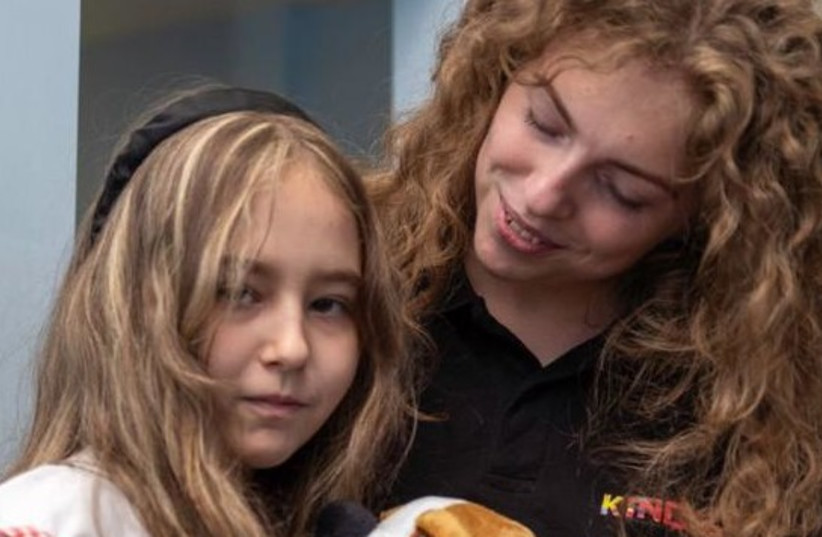As war rages on in Ukraine and a season of bitter coldness and erratic electricity commences, a center started by an Israeli-Ukrainian is administering developmental and psychological therapies to the nation's children.
“When we began seeing how deeply the children were suffering, we resolved to take action,” said David Roytman, who splits his time between Israel and his native Odessa, and founded the Kinder Velt (Children's World) Center nearly three years ago.
Roytman, an internationally-acclaimed artist and multimillionaire whose luxury Judaica company earned him the reputation as the ‘Jewish Louis Vuitton,’ is familiar with anxiety and trauma from war.
Born in Soviet Odessa and abandoned by both parents by the age of six months, he grew up as an orphan. Roytman went to Israel as a teenager where he enlisted in the Israel Defense Forces. During his military service, he battled the country’s enemies during Operation Defensive Shield, dodging rockets and bullets in the notorious Jenin refugee camps. After his discharge, Roytman suffered PTSD, yet eventually found his healing through art.
"The world at large is noting the numbers of physical casualties here in Ukraine, but we’re focusing on the future and realizing that, if we don’t take action, we’re going to be left with a generation of emotionally-scarred adults. Every child who comes to our center receives free therapy."
David Roytman
When Russia invaded Ukraine last February, many children fled. The center, which offered therapies including speech therapy, occupational therapy and emotional counseling, was shuttered. However, as war continued ravaging the country, claiming 30,000 lives and displacing over 12 million, Roytman reopened his center and is currently offering relief to hundreds of suffering children.
“We reoriented the Kinder Velt Therapy Centers, which before the war, were primarily art center therapies [converted] into trauma centers," Roytman recalled.
"The world at large is noting the numbers of physical casualties here in Ukraine, but we’re focusing on the future and realizing that, if we don’t take action, we’re going to be left with a generation of emotionally-scarred adults," he said. "Every child who comes to our center receives free therapy. They learn to process their pain, fears and feelings, and they sleep better and more securely at night. This is a life-changer for many, many children.”

What Ukraine can learn from Israel
The center in Ukraine draws on experience from another country that knows war and terror too well: Israel.
Over the years, tens of thousands of rockets have rained down upon Israel’s cities and towns, and huge numbers of children and adults, civilians, soldiers and veterans alike have suffered serious psychological trauma. Aware of the dire long-term consequences of war and rocket attacks on its civilian population – and, specifically, its children – Israel established numerous psychotrauma centers across the country to provide psychological assistance to victims of rocket and terror attacks.
Daphna Maximov, an Israeli child psychologist working with Ukrainian children, explained the center's innovative therapy, called "Hibuki," which translates loosely as "Huggy."
"Hibuki makes use of a plush puppy with long limbs and sad expression that has worked wonders with thousands of children. We first made use of this tool in Israel back in 2006 during the Second Lebanon War after a group of Israeli therapists led by Dr. Shai Chen-Gal, a clinical psychologist, saw the stuffed animal as an effective, quick and cheap means of treating trauma for a large number of people," she said.
“In Israel, Hibuki was a grassroots project that took flight to become a nationally-acclaimed success. When the war first broke out in Ukraine, I understood immediately that there were cultural differences, and that the warfare itself was different, which was why the project required significant adaptations," Maximov said.
“We introduced various changes into the project, beginning with age. The original Israeli program was geared to treat kids between the ages of 4 and 8, but we increased the scope of the therapy to treat adolescents. Interestingly, the very first Ukrainian patient was 15 years old, which proved to us just how effective Hibuki can be for teenagers, as well."
The child psychologist continued: “The puppy, which we call Hibuki, functions as a therapy tool. We ask the child why Hibuki looks so sad, which inevitably causes him to answer something like, ‘Because a rocket fell on his doghouse' or ‘Because he has no friends.' Hibuki’s expression gives the puppy a distinctly human feel, and its long arms enfold the child in a soft embrace. Many studies have proven that Hibuki works wonders for kids suffering PTSD."
